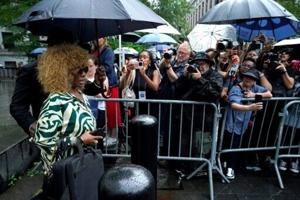Jurors in the high-profile trial of music mogul Sean “Diddy” Combs returned to the deliberation room on Wednesday, tasked with reaching a unanimous verdict on the most serious charge: leading a criminal organization. This follows their partial verdict on four of the five charges, which include allegations of sex trafficking and transportation for prostitution. The New York jury, comprised of eight men and four women, informed the court on Tuesday that they were deadlocked on the racketeering charge, citing “unpersuadable opinions on both sides.”
The trial, which has captured national attention due to Combs’ celebrity status, centers around accusations that the music icon orchestrated a criminal enterprise. The jury’s inability to reach a consensus on the racketeering charge highlights the complexity of the case and the challenge of proving such serious allegations beyond a reasonable doubt.
Background and Case Details
Sean “Diddy” Combs, a prominent figure in the music industry, has been under scrutiny since the allegations first surfaced. The prosecution argues that Combs used his influence and resources to facilitate illegal activities, including sex trafficking, under the guise of his business operations. The defense, however, has maintained that Combs is a victim of false accusations, brought forth by individuals seeking financial gain or revenge.
The charges stem from a lengthy investigation into Combs’ business dealings and personal associations. Prosecutors have presented evidence they claim links Combs to a network engaged in illicit activities, while the defense has countered with evidence and testimonies aimed at discrediting the prosecution’s narrative.
Expert Opinions and Legal Perspectives
Legal experts have weighed in on the challenges faced by both the prosecution and defense in this case. According to criminal defense attorney Lisa Thompson, “Racketeering charges are notoriously difficult to prove because they require showing a pattern of criminal conduct and the defendant’s leadership role in an organization. The jury’s indecision reflects these complexities.”
Meanwhile, former prosecutor James Allen noted, “The jury’s partial verdict indicates they found the evidence compelling on some counts, but the racketeering charge requires a higher burden of proof. It’s not uncommon for jurors to struggle with such charges, especially in cases involving high-profile defendants.”
Historical Parallels and Implications
The Combs trial draws parallels to other celebrity legal battles where public perception and media coverage have played significant roles. Past cases involving prominent figures have shown that the court of public opinion can sometimes overshadow the legal proceedings, adding pressure on jurors to deliver a verdict that aligns with societal expectations.
The outcome of this trial could have far-reaching implications for Combs’ career and personal life. A conviction on the racketeering charge would not only tarnish his reputation but could also result in significant legal penalties, including imprisonment.
Looking Ahead: Possible Outcomes and Next Steps
As the jury continues its deliberations, the court remains on high alert for any developments. If the jury remains deadlocked, the judge may declare a mistrial on the racketeering charge, leaving the prosecution to decide whether to retry Combs on that count. Alternatively, a unanimous verdict could bring a resolution to this legal saga.
For now, the eyes of the nation remain fixed on the courtroom, awaiting the jury’s decision. The trial’s conclusion could set a precedent for future cases involving allegations of criminal conduct by high-profile individuals, influencing both legal strategies and public discourse.
Regardless of the outcome, the Combs trial underscores the complexities of the legal system and the challenges of adjudicating cases that sit at the intersection of celebrity, crime, and media scrutiny.
 Fiji Rejects Chinese Military Base Amid Pacific Power Struggle
Fiji Rejects Chinese Military Base Amid Pacific Power Struggle Shocking Revelations of Mass Deaths in Syrian Prison Near Damascus
Shocking Revelations of Mass Deaths in Syrian Prison Near Damascus Shocking Revelations: Mass Executions in Syrian Prison Uncovered
Shocking Revelations: Mass Executions in Syrian Prison Uncovered Paramount Settles Trump Lawsuit Over ’60 Minutes’ Interview for $16 Million
Paramount Settles Trump Lawsuit Over ’60 Minutes’ Interview for $16 Million Japan’s Upper House Election: A Crucial Test for Prime Minister Ishiba
Japan’s Upper House Election: A Crucial Test for Prime Minister Ishiba